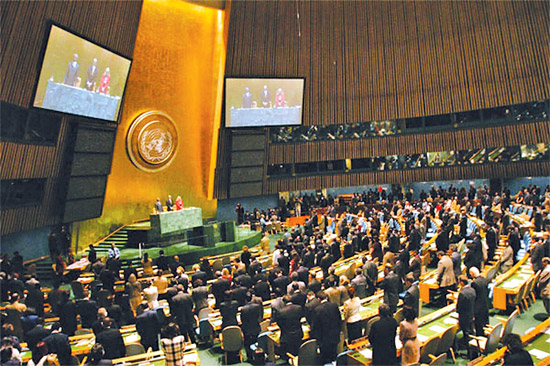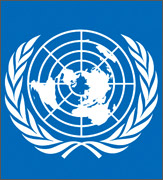The Rule of Law and global challenges
By Dr. Palitha KOHONA
Having recently emerged from a world where might prevailed and the
weak suffered, let us not forget that fundamentally, the rule of law
serves as a critical bulwark for mediating and facilitating between and
among competing and often divisive interests between the powerful and
the weak and between the rich and the poor, at the national and
international levels.
|

The UN Charter is the bedrock of the international rule of law. |
Any tendency to return to an age where force prevailed, in order to
enforce concepts of the rule of law as understood by some must be
avoided. It is also an often repeated error to expect the poor, the weak
and the under-resourced to immediately be in unmistakable compliance
with standards that may have taken hundreds of years to develop by their
champions.
My delegation is pleased to align itself with the statement made on
behalf of the Non-Aligned Movement by the delegation of Iran. My
delegation also warmly welcomes the convening of this thematic debate by
the President of the General Assembly and congratulates him on this
timely initiative.
The rule of law acts as an invisible ameliorating force to underwrite
stability, peace and coherence, to enhance and improve the quality of
international coexistence and of human life itself. It is also the
invisible protective shield that safeguards the weak, the meek, the poor
and the powerless. As has been rightly recognised, equitable solutions
to many of our global challenges, whether it be the promotion of
democracy, human rights, women’s rights, sustainable development,
combating organised transnational crime and terrorism, all hinge on the
advancement and consolidation of the rule of law at the national and
international levels.
Modern, traditional mechanisms
However, any tendency to revert to an age where force prevailed, to
enforce concepts of the rule of law must be avoided. The United Nations
has a critical role to play in furthering these efforts. The rule of law
must also combine existing and traditional mechanisms with the modern.
For us, member states of the Organisation, the Charter is the bedrock
of the international rule of law. Much of what we cherish as States and
peoples emanates from this instrument. The Charter is further
strengthened by over 500 multilateral treaties concluded under the
auspices of the United Nations and deposited with the Secretary General
covering almost all aspects of human interaction. Very little remains
unaddressed. These are the products of patient balancing of interests
and meticulous negotiations among States. The rules of conduct developed
over the centuries and reflected in accepted custom add further
substance to the international rule of law.
 Judgments of international tribunals and views of eminent jurists
further nourish this concept. However, when we seek to implement this
vast body of rules and standards, often vague, we also need prior
agreement on its details, on its content. Many aspects of the
international rule of law remain vague and need further elaboration, and
the United Nations can and must provide the forum to further clarify
this. It is also an often repeated error to expect the poor, the weak
and the under-resourced to immediately be in unmistakable compliance
with standards that may have taken hundreds of years to develop by their
champions. The development of the needed infrastructure and the capacity
takes time, as does the appreciation of the content. Judgments of international tribunals and views of eminent jurists
further nourish this concept. However, when we seek to implement this
vast body of rules and standards, often vague, we also need prior
agreement on its details, on its content. Many aspects of the
international rule of law remain vague and need further elaboration, and
the United Nations can and must provide the forum to further clarify
this. It is also an often repeated error to expect the poor, the weak
and the under-resourced to immediately be in unmistakable compliance
with standards that may have taken hundreds of years to develop by their
champions. The development of the needed infrastructure and the capacity
takes time, as does the appreciation of the content.
Much as we may subscribe to the international rule of law, it is also
important to recognise the local circumstances when we seek to advance
it at national level. The resources, the familiarity, established
practices, history and a host of other factors need to be taken into
account. At this stage of human development, it is unrealistic to expect
all norms of behaviour to be implemented domestically in the different
countries equally.
Differences in implementation
Given the vague content in many cases, there are bound to be
differences in their implementation. Countries emerging from conflict,
for example, often find that their domestic institutions, including
democracy, have been strained and in most instances laid threadbare. It
is also likely that the uncertainties of war have fostered the emergence
of a range of criminal activity, organised crime, human trafficking,
drug dealing, etc.
These organised criminal organisations may even become stronger than
the State. In such trying circumstances, insensitive prescriptions of
instantaneous solutions based on preconceptions, often by sometimes
well-meaning external entities, might cause more harm than good and a
loss of confidence.
One size does not fit all and foreign prescriptions however fondly
embraced by external players, never really help to address deep-seated
domestic ills. Mr. Von der Schullenburg articulated this concern well;
what he said is a lesson to all. Surely, we need to have as our goal a
perfect world but it is naive to seek immediate entry to utopia.
In the case of my country, Sri Lanka, it was our very democracy and
its institutions that were under siege for over 27 years by a ruthless
terrorist outfit. We must therefore, recognise the tensions and
difficulties that emerge while we try to balance national security
interests and the advancement of individual rights under these demanding
local circumstances as we move forward.
Some countries, owing to their strong legal foundations and resource
bases, may have the resilience and the capacity to restore democratic
institutions quickly. They may also rapidly create their own local
mechanisms to consolidate peace, encourage reconciliation and, most
importantly, strengthen democratic institutions. But not all countries
are equally placed. As Mr. Gueheno said, there is, therefore, a need to
give countries on the road to recovery, the much needed space to launch
that restorative process to arrive at an even keel.
In post-conflict contexts, peace, stability and economic advancement
are critical catalysts to ensuring progress towards a smooth
reconstruction and rehabilitation process and sustainable peace and
reconciliation in the long-term. Sri Lanka has acknowledged that need.
Democratically elected and responsible governments pay heed to these
requirements, especially when they receive decisive mandates from their
people. Countries who have achieved appreciable progress on the key MDGs
would seem to already have an overall enabling environment’ for
achieving further economic and social progress.
External prescriptions to our political and economic problems,
including addressing issues related to human rights, must necessarily
have local resonance and public acceptance. Legal outcomes alone to
long-standing political issues do not necessarily create a conducive
atmosphere for enduring peace.
Capacity building efforts
Therefore, in such contexts, the United Nations must provide
leadership in capacity building efforts to address the gaps while also
factoring in local sensitivities.
The United Nations also has to create an understanding background for
the involvement of external actors. Further, UN assistance to develop
national legal frameworks incorporating as appropriate, international
norms and standards, must ensure coordination and cooperation between
national institutions, different UN entities and civil society to avoid
duplication of work and waste of resources to ensure best outcomes.
Promoting and consolidating the rule of law at national level does
not happen in a vacuum or in a static environment. A clinical or
surgical approach to promoting this concept without the accompanying
tangible guarantees for improving the social, economic and cultural
quality of life, would be less meaningful and less holistic. Neither do
prescriptions or analyses derived from stark right and wrong
perspectives and other country experiences serve as templates for highly
complex situations. Therefore, our thematic discourses at the
inter-governmental level must focus more on the practice of the rule of
law.
The principle of sovereign equality enshrined in the UN Charter which
is intrinsic to the international rule of law must be maintained as
international rules are made and implemented. It is a principle that
Member States must abide by and which protects all States, especially
the small and the weak.
Equally important, is the maintenance of the principle of
non-interference in the internal affairs of Member States, especially in
situations that do not pose a threat to international peace and
security.
Exceptionally, specific circumstances may call for external
involvement which should be based on the broad agreement of States. The
right to implement the rule of law should not be the right of a handful
nor should it be selective. Selective implementation would cast massive
doubts on credibility.
Training, outreach programs
We commend the work that is done by the Office of Legal Affairs and
note with appreciation the various outreach, and training programs
conducted by the Office of Legal Affairs, in particular the Treaty
Section. The annual treaty event is welcomed by all States.
An important aspect of the rule of law at international level is the
obligation of States to implement at national level, commitments
undertaken by them under treaties and other international agreements.
Compliance with treaty obligations is an area where the UN can play a
meaningful role. Sri Lanka has indeed been proactive in adopting
national mechanisms to comply with our commitments under the treaties to
which it is a party.
Sri Lanka has always advocated the settlement of internal and
international disputes by peaceful means. Even in our own case with the
LTTE, a terrorist outfit that challenged the very existence of the State
of Sri Lanka, we took early recourse to negotiations.
It was only after these efforts were repeatedly rebuffed, and endless
and bloody provocations followed, that Sri Lanka launched a limited
humanitarian rescue operation. The Government of Sri Lanka is committed
to protecting the rights of all its people and fulfilling their just
needs to enable them to realise their aspirations. Our willingness to
engage with the United Nations to promote the rule of law based on
constructive, fair, non-selective and objective assessments remains
undiminished.
Dr. Palitha T.B. Kohona, Sri Lanka’s Permanent Representative to the
United Nations made this statement at the UN General Assembly Thematic
Debate last week. |

